
As the 2030 ban on the sale of new petrol and diesel cars looms and more motorists shift to electric, attention will turn from private to business road users and what they can do to reduce their impact on the environment.
After all, the International Transport Forum says that almost one third of transport-related CO2 emissions are from trade-related freight fleets. Factor in other commercial vehicles and the real figure is likely much higher.
To get a jump on the inevitable electrification, many companies are taking matters into their own hands before legislation demands it and committing to EV fleet targets. We take a look at the top companies who have signed up to such initiatives and how they could fare by the end of the decade.
Ridesharing firm Lyft aims to have two million EVs on the road by 2030
Leading the way by a country mile is Uber competitor Lyft, a US- and Canada-based ridesharing company. By 2030, the company has committed to have a staggering two million electric vehicles and scooters on the road.

Lyft’s pledge is so vast that second-placed Amazon would need a fleet 20 times bigger to match them in terms of scale. However, there’s no understating the tech giant’s target.
While Lyft doesn’t directly own all of its vehicles, Amazon does. The first of the custom-built Rivian vans made their maiden delivery runs in LA this year with 10,000 of them set to be on the road by next year, before the full fleet is up and running by 2030. The commitment is part of Amazon’s promise of being a carbon-neutral company by 2040.
The UK is also well represented, with four businesses in the top 10. GlaxoSmithKline, a big player in Britain’s Covid vaccination programmes, aims to have 19,000 low or zero-emissions vehicles on the go by 2030, while BT Group is eyeing up an EV fleet of 30,000.
The UK government is leading by example and planning to electrify its entire fleet of 40,000 vehicles by 2027 – three years ahead of the ban on new petrol and diesel cars.
The UK government’s EV fleet could save 230,000-plus tonnes of CO2 emissions each year
Looking at the EV fleet commitments in terms of the potential CO2 emissions savings, the numbers become even more significant. Lyft, with its 2,000,000-strong fleet, would save 11.8 million tonnes in CO2 emissions every year – a figure so dizzying it makes the other CO2 savings in our study look irrelevant.

That isn’t the case, of course, as even Natwest Group at the foot of the table will register reductions of almost 20,000 tonnes by 2040.
In all, 11 of the companies here will tally more than 100,000 tonnes in saved CO2 emissions every year. Just missing out on a six-digit figure is the British-Swedish pharma AstraZeneca.
Methodology
We applied the average emissions figure (159g of CO2 for every kilometre travelled, according to transport campaign group Transport & Environment) and average yearly mileage (36,975km, according to the UK government’s statistics) to the number of vehicles in each fleet.
The size of the fleets was collated from publicly available EV commitments for each company.
Bookmark our news section for more interesting features, insight and news, or browse our business leasing deals if you’re in the market for a company car.















